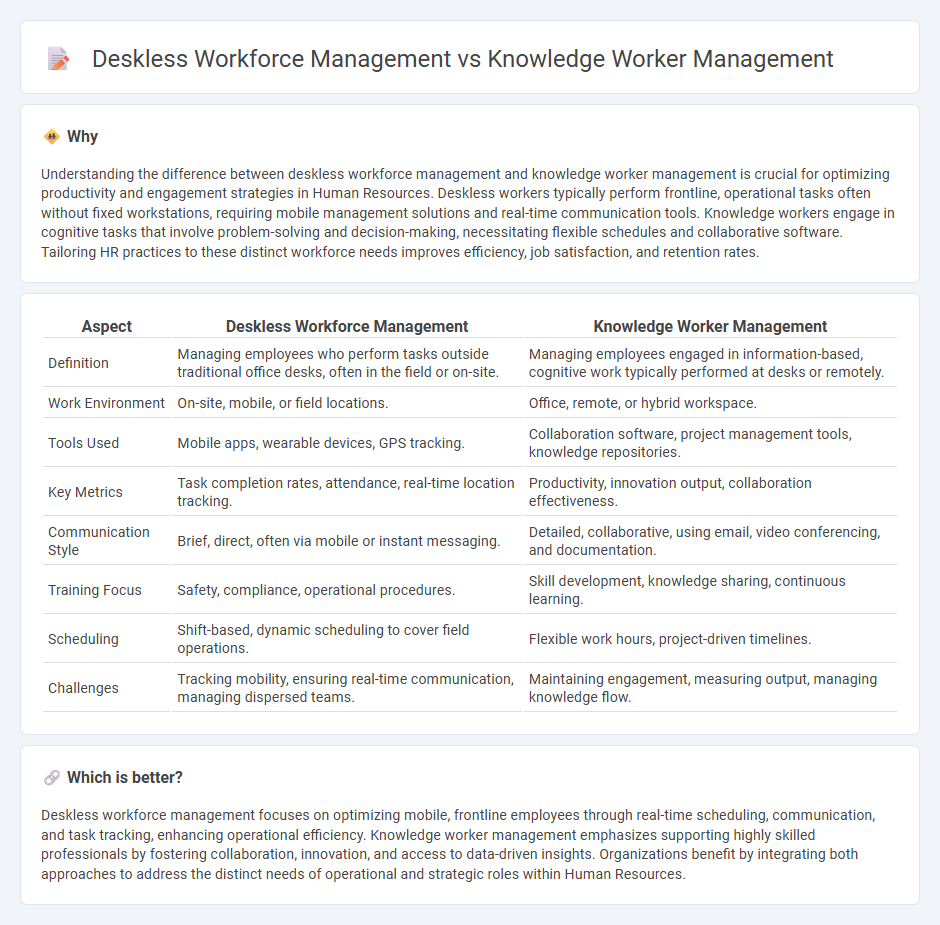
Deskless workforce management focuses on optimizing productivity for employees without fixed workstations, such as field workers and frontline staff, using mobile technology and real-time communication tools. Knowledge worker management prioritizes collaboration, information sharing, and innovation among employees who rely on cognitive skills and access to complex data. Explore how tailored strategies for these distinct workforce types can enhance organizational efficiency and employee engagement.
Why it is important
Understanding the difference between deskless workforce management and knowledge worker management is crucial for optimizing productivity and engagement strategies in Human Resources. Deskless workers typically perform frontline, operational tasks often without fixed workstations, requiring mobile management solutions and real-time communication tools. Knowledge workers engage in cognitive tasks that involve problem-solving and decision-making, necessitating flexible schedules and collaborative software. Tailoring HR practices to these distinct workforce needs improves efficiency, job satisfaction, and retention rates.
Comparison Table
| Aspect | Deskless Workforce Management | Knowledge Worker Management |
|---|---|---|
| Definition | Managing employees who perform tasks outside traditional office desks, often in the field or on-site. | Managing employees engaged in information-based, cognitive work typically performed at desks or remotely. |
| Work Environment | On-site, mobile, or field locations. | Office, remote, or hybrid workspace. |
| Tools Used | Mobile apps, wearable devices, GPS tracking. | Collaboration software, project management tools, knowledge repositories. |
| Key Metrics | Task completion rates, attendance, real-time location tracking. | Productivity, innovation output, collaboration effectiveness. |
| Communication Style | Brief, direct, often via mobile or instant messaging. | Detailed, collaborative, using email, video conferencing, and documentation. |
| Training Focus | Safety, compliance, operational procedures. | Skill development, knowledge sharing, continuous learning. |
| Scheduling | Shift-based, dynamic scheduling to cover field operations. | Flexible work hours, project-driven timelines. |
| Challenges | Tracking mobility, ensuring real-time communication, managing dispersed teams. | Maintaining engagement, measuring output, managing knowledge flow. |
Which is better?
Deskless workforce management focuses on optimizing mobile, frontline employees through real-time scheduling, communication, and task tracking, enhancing operational efficiency. Knowledge worker management emphasizes supporting highly skilled professionals by fostering collaboration, innovation, and access to data-driven insights. Organizations benefit by integrating both approaches to address the distinct needs of operational and strategic roles within Human Resources.
Connection
Effective deskless workforce management integrates real-time communication tools and mobile access, enhancing productivity and engagement for on-the-go employees. Knowledge worker management leverages collaborative platforms and knowledge-sharing systems to optimize information flow and innovation among specialized staff. Both strategies converge in utilizing technology to streamline workflows, enabling seamless coordination and maximizing organizational efficiency.
Key Terms
**Knowledge Worker Management:**
Knowledge Worker Management centers on optimizing productivity and collaboration for employees who primarily handle information, make decisions, and perform intellectual tasks using digital tools. It involves advanced software solutions for project management, communication, and data analytics to enhance efficiency in knowledge-intensive roles. Explore how innovative strategies in Knowledge Worker Management can transform your organization's performance.
Talent Development
Talent development in knowledge worker management emphasizes continuous skill enhancement and strategic career growth enabled by advanced LMS platforms and personalized training programs. Deskless workforce management prioritizes real-time, on-the-job training and upskilling through mobile learning apps and AI-based performance feedback to improve frontline productivity. Discover how tailored talent development strategies transform diverse workforce capabilities by exploring the latest management solutions.
Performance Appraisal
Performance appraisal in knowledge worker management emphasizes individualized goal setting, continuous feedback, and competency development to enhance innovation and strategic thinking. Deskless workforce management, by contrast, prioritizes real-time performance tracking through mobile technologies, task completion rates, and operational efficiency to improve frontline productivity. Explore how tailored appraisal methods can optimize outcomes across diverse workforce types.
Source and External Links
How to Lead, Manage and Motivate Knowledge Workers? - PHPKB - Managing knowledge workers effectively requires adapting leadership styles to recognize their expertise, balancing authority with sensitivity, and creating a supportive culture and framework where their knowledge and creativity can flourish; managers need to act as leaders, coaches, and technologists while acknowledging workers' independent thinking and motivations.
Knowledge work versus "Knowledge management" - iManage - Knowledge worker management involves providing organized knowledge so that knowledge workers can apply their expertise to interpret data and deliver value, emphasizing the distinction between creating and managing knowledge and the application of that knowledge by workers to achieve actionable outcomes efficiently.
The Specifics of Management of the Knowledge Worker - Effective management of knowledge workers demands treating them as valuable assets rather than costs and recognizing that traditional management theories based on efficiency and disposability are inadequate; instead, management should foster self-management, innovation, continuous learning, and quality output.
 dowidth.com
dowidth.com